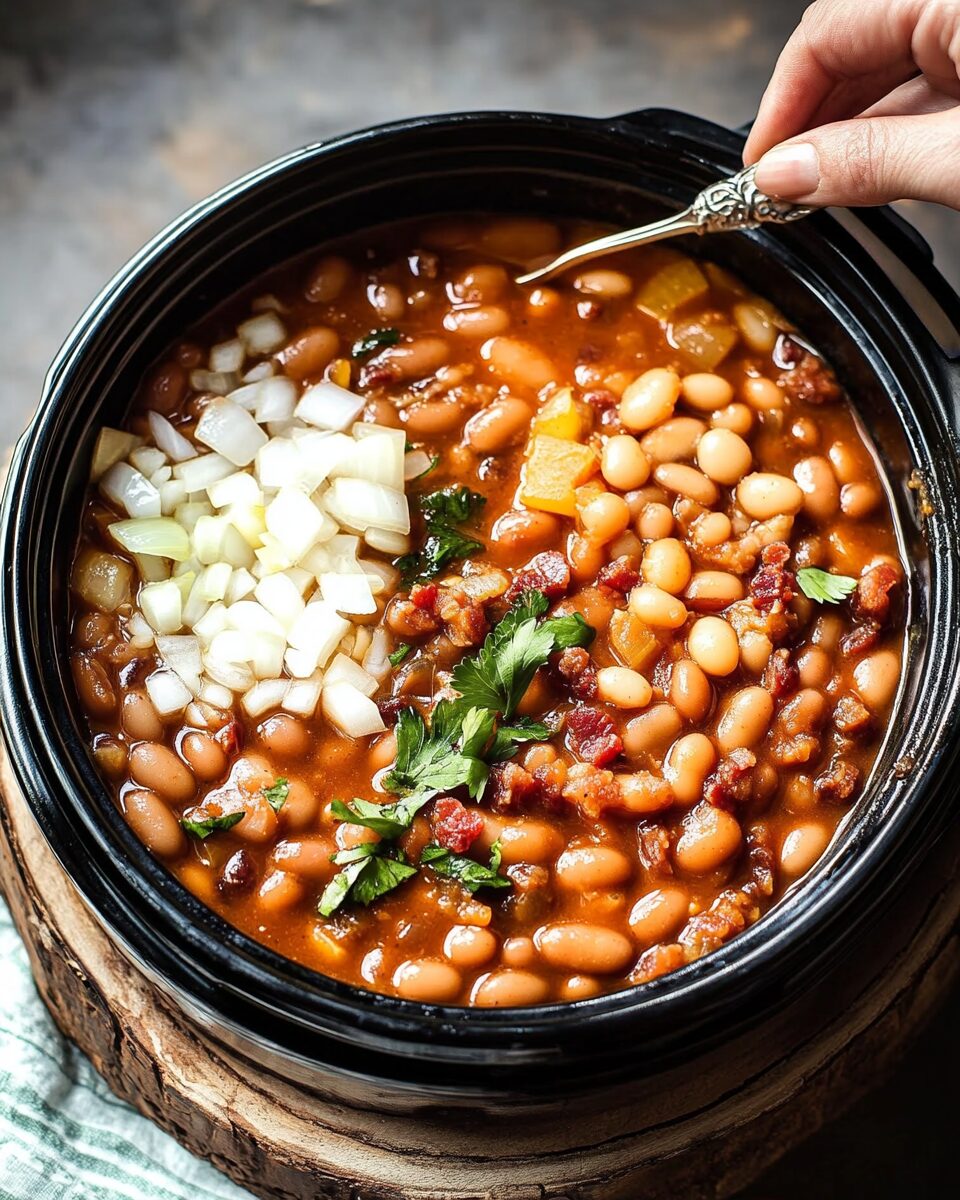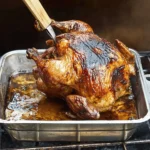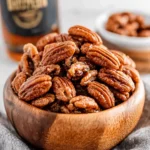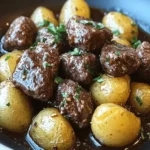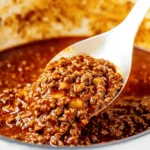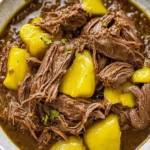A hearty and flavorful dish perfect for summer gatherings, these BBQ Baked Beans are slow-cooked to perfection in a crockpot. Loaded with smoky, sweet, and tangy flavors, this classic side pairs well with grilled meats and is easy to prepare with minimal effort. It’s a comforting favorite for BBQs, potlucks, and family dinners.
FULL RECIPE
Ingredients
- 4 cups canned baked beans (drained slightly)
- 1/2 cup barbecue sauce
- 1/4 cup brown sugar
- 1/4 cup ketchup
- 1 tablespoon yellow mustard
- 1/2 teaspoon garlic powder
- 1/2 teaspoon onion powder
- 1/2 teaspoon smoked paprika
- 1/4 teaspoon black pepper
- 1/2 cup chopped onion
- 1/2 cup chopped green bell pepper
- 6 slices bacon, cooked and crumbled
Directions
- In a large bowl, combine the baked beans, barbecue sauce, brown sugar, ketchup, mustard, garlic powder, onion powder, smoked paprika, and black pepper.
- Stir in the chopped onion and green bell pepper.
- Fold in the cooked, crumbled bacon.
- Transfer the mixture into a crockpot.
- Cover and cook on low for 6–8 hours or high for 3–4 hours, stirring occasionally.
- Serve warm as a side dish.
Nutritional Information
- Calories: 280
- Protein: 9g
- Fat: 9g
- Saturated Fat: 3g
- Carbohydrates: 40g
- Sugars: 24g
- Fiber: 6g
- Sodium: 640mg
History of BBQ Baked Beans
BBQ baked beans have a rich history rooted in American culinary traditions. Originally, baked beans were a staple among Native Americans and early colonists who cooked them slowly over a fire using beans, maple syrup, and salt pork. The addition of barbecue flavors came later as grilling culture grew, especially in the Southern United States, blending smoky, sweet, and savory tastes. Today, BBQ baked beans symbolize comfort food and outdoor gatherings.
Cultural Significance
This dish is more than just a side; it represents communal meals and celebrations. BBQ baked beans are a mainstay at summer cookouts, picnics, and holidays like the Fourth of July, where friends and family come together to enjoy hearty, flavorful fare. It embodies the spirit of sharing and casual dining in American culture.
Flavor Profile
BBQ baked beans balance sweetness from brown sugar and ketchup with tangy barbecue sauce, enhanced by smoky bacon and spices like smoked paprika. The savory undertones from onions and mustard deepen the complexity, resulting in a rich, comforting dish that satisfies a variety of palates.
Cooking Technique in a Crockpot
Using a crockpot to make BBQ baked beans allows flavors to meld gradually over hours, intensifying taste and tenderizing ingredients without constant supervision. The slow cooker method is especially convenient, freeing up time and maintaining consistent heat, which is crucial for developing the dish’s signature texture.
Variations of BBQ Baked Beans
There are countless variations, such as adding ground beef or sausage for a meatier version, incorporating different types of beans for texture, or adjusting sweetness levels with honey or molasses. Some prefer spicy versions with jalapeños or cayenne, while others opt for vegetarian adaptations by omitting bacon and using smoked paprika or liquid smoke for flavor.
Health Considerations
While BBQ baked beans are delicious, they can be high in sugar and sodium. Using low-sugar barbecue sauce or reducing added sugars helps make the dish healthier. Incorporating more vegetables or whole beans can increase fiber content, aiding digestion and improving nutritional value.
Pairing Suggestions
This dish pairs beautifully with grilled meats like ribs, chicken, and burgers. It also complements vegetarian mains such as grilled portobello mushrooms or tofu. For a complete meal, serve with coleslaw, cornbread, or a fresh garden salad to balance richness.
Storage Tips
BBQ baked beans keep well in the refrigerator for 3 to 5 days when stored in an airtight container. Reheat gently on the stove or microwave to maintain texture and flavor. They also freeze well, making them convenient for batch cooking and future meals.
Meal Prep and Make-Ahead Benefits
Making BBQ baked beans ahead of time allows flavors to develop further overnight, making the dish even tastier. It’s a great option for busy weeks, as it can be quickly reheated. Preparing in advance also reduces day-of cooking stress during gatherings.
Common Mistakes to Avoid
Overcooking can cause beans to become mushy, while undercooking may leave flavors flat. Using too much sugar can overpower the dish, and skipping seasoning reduces depth. It’s important to balance ingredients and monitor cooking times for the best results.
Bacon’s Role in Flavor
Bacon adds a smoky, salty richness that elevates the baked beans from ordinary to exceptional. Its rendered fat infuses the beans with deep umami, making the dish heartier and more satisfying. For those avoiding pork, alternatives like smoked turkey or plant-based bacon can be used.
The Science Behind Slow Cooking Beans
Slow cooking allows starches and proteins in beans to break down gently, creating a creamy texture while preserving their shape. It also helps meld flavors slowly, which enhances sweetness and smokiness, giving the dish its characteristic richness.
Choosing the Right Beans
Traditional recipes often use navy beans or pinto beans because they hold shape well and have a mild flavor that absorbs the barbecue sauce. Some cooks mix bean varieties for texture contrast, but it’s important to use fully cooked or canned beans to avoid long cooking times.
The Importance of Seasonings
Seasonings like garlic powder, onion powder, smoked paprika, and mustard powder create layers of flavor. They add subtle heat, smokiness, and tang, preventing the dish from being one-dimensional. Fresh aromatics like onion and bell pepper also contribute texture and sweetness.
Sweetness Balance
Sweetness in BBQ baked beans cuts through the acidity of tomato-based sauces and the smokiness of bacon. Brown sugar is traditional, but some recipes use molasses or maple syrup to add depth. Adjusting sweetness is key to complement other ingredients without overpowering.
Barbecue Sauce Varieties
The choice of barbecue sauce significantly affects the final flavor. Some sauces are tangier, others sweeter or spicier. Using a high-quality sauce or homemade version can elevate the dish, while experimenting with regional styles (e.g., Kansas City vs. Carolina) offers unique twists.
Serving Temperature
BBQ baked beans are best served warm to bring out their full flavor and comforting texture. Serving them too hot may mask some nuances, while too cold can make the sauce thick and less appealing. Allow a few minutes to cool slightly after cooking before serving.
Vegetarian and Vegan Adaptations
For plant-based diets, omitting bacon and using smoked paprika, liquid smoke, or smoked salt replicates smoky flavors. Using maple syrup or agave instead of brown sugar and ensuring barbecue sauce is vegan-friendly allows everyone to enjoy this classic dish.
Environmental Impact
Beans are a sustainable protein source compared to meat, requiring fewer resources to produce. Incorporating plant-based versions of BBQ baked beans helps reduce environmental footprints while maintaining satisfying flavors and nutrition.
Crockpot Cleaning and Maintenance
Cooking beans in a crockpot can sometimes leave stubborn residue. To maintain your appliance, soak immediately after use and clean with a nonabrasive sponge. Regular maintenance prolongs the life of your slow cooker and ensures hygienic cooking.
Conclusion
BBQ baked beans are a timeless, versatile dish that brings warmth and flavor to any meal. Their slow-cooked richness and balance of smoky, sweet, and savory notes make them a beloved side for countless occasions. Whether traditional or adapted to dietary preferences, this recipe continues to unite people around the table, embodying the spirit of comfort food and shared enjoyment. Preparing them in a crockpot offers convenience and deep flavor development, making this classic dish accessible year-round. With thoughtful ingredient choices and simple cooking techniques, BBQ baked beans remain a delicious and satisfying staple of American cuisine.

